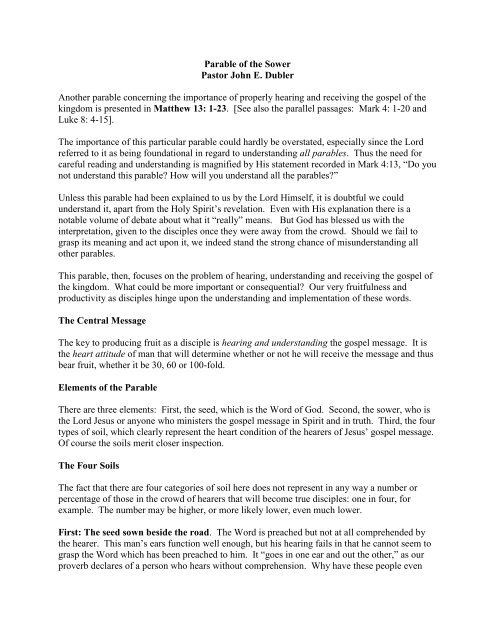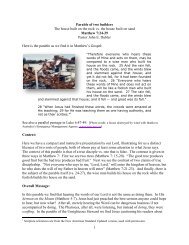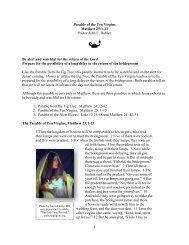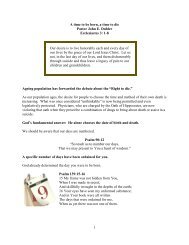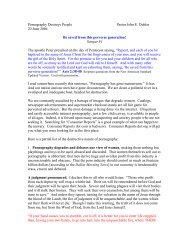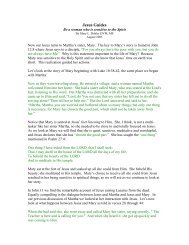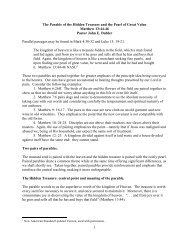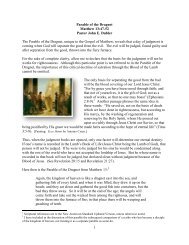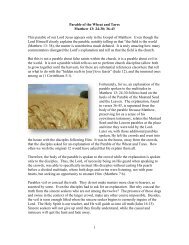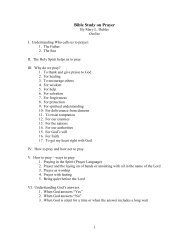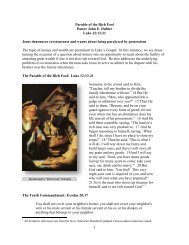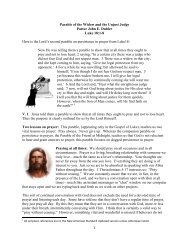Parable of the Sower and Four Soils. - Pastor John Dubler
Parable of the Sower and Four Soils. - Pastor John Dubler
Parable of the Sower and Four Soils. - Pastor John Dubler
You also want an ePaper? Increase the reach of your titles
YUMPU automatically turns print PDFs into web optimized ePapers that Google loves.
<strong>Parable</strong> <strong>of</strong> <strong>the</strong> <strong>Sower</strong><br />
<strong>Pastor</strong> <strong>John</strong> E. <strong>Dubler</strong><br />
Ano<strong>the</strong>r parable concerning <strong>the</strong> importance <strong>of</strong> properly hearing <strong>and</strong> receiving <strong>the</strong> gospel <strong>of</strong> <strong>the</strong><br />
kingdom is presented in Mat<strong>the</strong>w 13: 1-23. [See also <strong>the</strong> parallel passages: Mark 4: 1-20 <strong>and</strong><br />
Luke 8: 4-15].<br />
The importance <strong>of</strong> this particular parable could hardly be overstated, especially since <strong>the</strong> Lord<br />
referred to it as being foundational in regard to underst<strong>and</strong>ing all parables. Thus <strong>the</strong> need for<br />
careful reading <strong>and</strong> underst<strong>and</strong>ing is magnified by His statement recorded in Mark 4:13, “Do you<br />
not underst<strong>and</strong> this parable? How will you underst<strong>and</strong> all <strong>the</strong> parables?”<br />
Unless this parable had been explained to us by <strong>the</strong> Lord Himself, it is doubtful we could<br />
underst<strong>and</strong> it, apart from <strong>the</strong> Holy Spirit’s revelation. Even with His explanation <strong>the</strong>re is a<br />
notable volume <strong>of</strong> debate about what it “really” means. But God has blessed us with <strong>the</strong><br />
interpretation, given to <strong>the</strong> disciples once <strong>the</strong>y were away from <strong>the</strong> crowd. Should we fail to<br />
grasp its meaning <strong>and</strong> act upon it, we indeed st<strong>and</strong> <strong>the</strong> strong chance <strong>of</strong> misunderst<strong>and</strong>ing all<br />
o<strong>the</strong>r parables.<br />
This parable, <strong>the</strong>n, focuses on <strong>the</strong> problem <strong>of</strong> hearing, underst<strong>and</strong>ing <strong>and</strong> receiving <strong>the</strong> gospel <strong>of</strong><br />
<strong>the</strong> kingdom. What could be more important or consequential? Our very fruitfulness <strong>and</strong><br />
productivity as disciples hinge upon <strong>the</strong> underst<strong>and</strong>ing <strong>and</strong> implementation <strong>of</strong> <strong>the</strong>se words.<br />
The Central Message<br />
The key to producing fruit as a disciple is hearing <strong>and</strong> underst<strong>and</strong>ing <strong>the</strong> gospel message. It is<br />
<strong>the</strong> heart attitude <strong>of</strong> man that will determine whe<strong>the</strong>r or not he will receive <strong>the</strong> message <strong>and</strong> thus<br />
bear fruit, whe<strong>the</strong>r it be 30, 60 or 100-fold.<br />
Elements <strong>of</strong> <strong>the</strong> <strong>Parable</strong><br />
There are three elements: First, <strong>the</strong> seed, which is <strong>the</strong> Word <strong>of</strong> God. Second, <strong>the</strong> sower, who is<br />
<strong>the</strong> Lord Jesus or anyone who ministers <strong>the</strong> gospel message in Spirit <strong>and</strong> in truth. Third, <strong>the</strong> four<br />
types <strong>of</strong> soil, which clearly represent <strong>the</strong> heart condition <strong>of</strong> <strong>the</strong> hearers <strong>of</strong> Jesus’ gospel message.<br />
Of course <strong>the</strong> soils merit closer inspection.<br />
The <strong>Four</strong> <strong>Soils</strong><br />
The fact that <strong>the</strong>re are four categories <strong>of</strong> soil here does not represent in any way a number or<br />
percentage <strong>of</strong> those in <strong>the</strong> crowd <strong>of</strong> hearers that will become true disciples: one in four, for<br />
example. The number may be higher, or more likely lower, even much lower.<br />
First: The seed sown beside <strong>the</strong> road. The Word is preached but not at all comprehended by<br />
<strong>the</strong> hearer. This man’s ears function well enough, but his hearing fails in that he cannot seem to<br />
grasp <strong>the</strong> Word which has been preached to him. It “goes in one ear <strong>and</strong> out <strong>the</strong> o<strong>the</strong>r,” as our<br />
proverb declares <strong>of</strong> a person who hears without comprehension. Why have <strong>the</strong>se people even
come to listen in <strong>the</strong> first place? Many motives might be assumed. Perhaps <strong>the</strong>y were forced to<br />
come by parents or well-meaning friends. Perhaps <strong>the</strong>y have<br />
only a self-centered desire to be with friends; to see o<strong>the</strong>rs <strong>and</strong><br />
to be seen. For <strong>the</strong>m a play or party will do as well as <strong>the</strong><br />
event or church where <strong>the</strong> gospel is preached, for <strong>the</strong>y have<br />
not come to carefully listen. They are not seeking a message<br />
<strong>of</strong> hope <strong>and</strong> thus <strong>the</strong>y never allow such a message to sink in.<br />
Perhaps <strong>the</strong>y come only from habit, or worse, because <strong>the</strong>y are<br />
driven by guilt. All such mindless motives provide easy prey<br />
for Satan’s schemes. This failure to comprehend spiritual<br />
things is <strong>the</strong> very essence <strong>of</strong> seed which falls beside <strong>the</strong> road. It does not enter <strong>the</strong> warmth <strong>of</strong> <strong>the</strong><br />
earth, that is <strong>the</strong> heart <strong>of</strong> man, but abides alone on a hard surface—<strong>the</strong> hard heart <strong>of</strong> a flippant<br />
<strong>and</strong> heedless man.<br />
The birds. In His explanation <strong>of</strong> <strong>the</strong> parable, Jesus tells us that <strong>the</strong> birds are <strong>the</strong> evil one. Satan<br />
is waiting, lurking round <strong>the</strong> edges <strong>of</strong> this man’s heart, waiting his chance to snap up <strong>the</strong> seed<br />
once it has been sown by <strong>the</strong> preacher. Listeners must be careful not to delay receiving <strong>and</strong><br />
acting upon <strong>the</strong> Word preached. Do not say to yourself, “I will consider this later, or perhaps I’ll<br />
get <strong>the</strong> recording <strong>of</strong> this message <strong>and</strong> hear it sometime when it is more convenient for me.” By<br />
<strong>the</strong> time that you get back to <strong>the</strong> message, <strong>the</strong> seed <strong>of</strong> <strong>the</strong> Word will have been gobbled up by <strong>the</strong><br />
voracious birds. Satan does not wait long before snatching it away.<br />
Second: The Rocky Places. The man illustrated by <strong>the</strong> rocky soil hears <strong>and</strong> initially quite<br />
joyfully receives <strong>the</strong> Word, but he fails to follow up with meaningful discipleship. When <strong>the</strong><br />
promised trials <strong>and</strong> tribulations emerge, he wi<strong>the</strong>rs away. The rocky soil is not solid rock, or it<br />
would be identical to <strong>the</strong> beaten path, with <strong>the</strong> seed<br />
not even entering <strong>the</strong> soil nor sprouting. Here <strong>the</strong>re<br />
is a little soil, though its depth is not sufficient to<br />
sustain a good root structure. This soil, <strong>and</strong> thus<br />
<strong>the</strong> heart <strong>of</strong> this man, is <strong>the</strong>refore shallow <strong>and</strong><br />
unproductive. His regard for <strong>the</strong> Word exists to<br />
start with, but it is not lasting.<br />
[Photo credit: Affiliation <strong>of</strong> Christian Geologists,<br />
http://www.wheaton.edu/ACG/index.stm ]<br />
Notice that this man experiences an initial rush <strong>of</strong><br />
good feeling. “This is <strong>the</strong> man who hears <strong>the</strong> word <strong>and</strong> immediately receives it with joy . . .” (v.<br />
20). He is very happy to hear a good Word from <strong>the</strong> heart <strong>of</strong> <strong>the</strong> Lord preached to him, but his<br />
regard for such spiritual things <strong>and</strong> even for <strong>the</strong> Lord Jesus Himself is based on feelings, not<br />
faith. Thus he has no victory over temptation or sin. He “has no firm root in himself,” no<br />
commitment which would provide a pathway for <strong>the</strong> Holy Spirit to minister His grace <strong>and</strong> keep<br />
him in <strong>the</strong> hour <strong>of</strong> temptation. He has no power to resist temptations or be sustained, even in<br />
minor trials. He is agreeable enough <strong>and</strong> even excited about what he has heard, but <strong>the</strong> reaction<br />
is emotional, not rooted nor grounded in faith.
To avoid <strong>the</strong> peril posed by this type <strong>of</strong> soil, <strong>the</strong> hearer, once he receives <strong>the</strong> gospel, must be<br />
immediately discipled. Putting Christ first in all one does, becoming separate from <strong>the</strong> world,<br />
praying, developing a love for <strong>the</strong> Word <strong>of</strong> God (through reading, memorizing <strong>and</strong> meditating),<br />
<strong>and</strong> fellowshipping with o<strong>the</strong>r believers are all foundational parts <strong>of</strong> becoming a true disciple.<br />
Third: The Thorns. The seed in this case is growing in decent enough <strong>of</strong> soil, but unhappily,<br />
o<strong>the</strong>r seeds are also growing in <strong>the</strong> same soil. These o<strong>the</strong>r seeds are not compatible with <strong>the</strong><br />
production <strong>of</strong> good, healthy grain plants. If allowed to grow alongside <strong>the</strong> good seed, <strong>the</strong>y will<br />
eventually grow up, take over <strong>and</strong> choke out <strong>the</strong> good plants. These are <strong>the</strong> thorns <strong>of</strong> which <strong>the</strong><br />
Lord speaks. The thorns, as He defines <strong>the</strong>m, are two categories <strong>of</strong> worldly concerns: first, <strong>the</strong><br />
worry <strong>of</strong> <strong>the</strong> world, <strong>and</strong> second, <strong>the</strong> deceitfulness <strong>of</strong> wealth. These thorns are not a minor<br />
concern <strong>and</strong> cannot be trifled with. The world,<br />
after all, promises every happiness <strong>and</strong> has a<br />
strong appeal. Unfortunately, <strong>the</strong> man whose<br />
heart condition is depicted by this type <strong>of</strong> soil<br />
eventually yields to <strong>the</strong>se temptations <strong>and</strong> falls<br />
away.<br />
Taking a closer look at <strong>the</strong> thorn plants we find<br />
first <strong>the</strong> “worry <strong>of</strong> <strong>the</strong> world.” The word “worry”<br />
is in <strong>the</strong> Greek: [merimna], meaning to<br />
be drawn in different directions <strong>and</strong> distracted,<br />
<strong>and</strong> hence signifying anxiety <strong>of</strong> heart <strong>and</strong> worrying. Worries <strong>of</strong> <strong>the</strong> world are material concerns:<br />
what we shall eat, what we shall drink <strong>and</strong> what we shall put on, to paraphrase Mat<strong>the</strong>w 6:25-20.<br />
The same word for worry is used in Philippians 4:6 where we read “Be anxious for nothing . . .”<br />
Certainly it may be said that worry is a cancer which eats away at our confidence in God as<br />
provider.<br />
In this regard, consider Mat<strong>the</strong>w 6:25-30:<br />
For this reason I say to you, do not be worried about your life, as to what you will<br />
eat or what you will drink; nor for your body, as to what you will put on. Is not life<br />
more than food, <strong>and</strong> <strong>the</strong> body more than clothing? Look at <strong>the</strong> birds <strong>of</strong> <strong>the</strong> air, that<br />
<strong>the</strong>y do not sow, nor reap nor ga<strong>the</strong>r into barns, <strong>and</strong> yet your heavenly Fa<strong>the</strong>r<br />
feeds <strong>the</strong>m. Are you not worth much more than <strong>the</strong>y? 27 "And who <strong>of</strong> you by being<br />
worried can add a single hour to his life? 28 "And why are you worried about<br />
clothing? Observe how <strong>the</strong> lilies <strong>of</strong> <strong>the</strong> field grow; <strong>the</strong>y do not toil nor do <strong>the</strong>y spin,<br />
29 yet I say to you that not even Solomon in all his glory clo<strong>the</strong>d himself like one <strong>of</strong><br />
<strong>the</strong>se. 30 "But if God so clo<strong>the</strong>s <strong>the</strong> grass <strong>of</strong> <strong>the</strong> field, which is alive today <strong>and</strong><br />
tomorrow is thrown into <strong>the</strong> furnace, will He not much more clo<strong>the</strong> you? You <strong>of</strong> little<br />
faith! 1<br />
Not willing to allow us to be drawn in two directions <strong>and</strong> subject to anxiety about worldly<br />
affairs, Jesus gave us two easily visible <strong>and</strong> common daily reminders not to worry: The birds <strong>of</strong><br />
1 Mat<strong>the</strong>w 6:25-30 All quoted passages are from <strong>the</strong> New American St<strong>and</strong>ard Updated version; used with<br />
permission.
<strong>the</strong> air <strong>and</strong> <strong>the</strong> flowers <strong>of</strong> <strong>the</strong> field. Thus we should turn all our cares into prayers, worrying<br />
about nothing <strong>and</strong> praying about everything. I like to use <strong>the</strong> common penny, found on <strong>the</strong><br />
sidewalk, parking lots or simply dropped on <strong>the</strong> floor in all conceivable places to remind me <strong>of</strong><br />
God’s care for us. Unless <strong>the</strong> penny is caked in filth, just pick it up <strong>and</strong> read <strong>the</strong>se words, “In<br />
God We Trust.” That serves to remind us that God is watching over us. When we acknowledge<br />
Him in all our ways, He directs our paths. His name adorns our money, even <strong>the</strong> very lowest<br />
coin <strong>of</strong> <strong>the</strong> realm. Shall we say “In God we trust” with our lips <strong>and</strong> not believe it in our hearts?<br />
The second thorn plant is called by our Lord, <strong>the</strong> “deceitfulness <strong>of</strong> wealth.” No substance ever<br />
made more promises it cannot keep than wealth. By its very nature it can be a strong deceiver,<br />
promising happiness, companionship <strong>and</strong> family joy. But it can provide none <strong>of</strong> <strong>the</strong>se things.<br />
One has only to read about lottery winners to know that wealth chokes <strong>the</strong> life out <strong>of</strong> souls who<br />
were formerly at least sure <strong>of</strong> who were <strong>the</strong>ir friends. The man who turns loose <strong>of</strong> family <strong>and</strong><br />
friends to grasp at money <strong>and</strong> <strong>the</strong> illusions that hang upon it is pitiable indeed.<br />
Jesus said, “For <strong>the</strong> Gentiles eagerly seek all <strong>the</strong>se things; for your heavenly Fa<strong>the</strong>r knows that<br />
you need all <strong>the</strong>se things. But seek first His kingdom <strong>and</strong> His righteousness, <strong>and</strong> all <strong>the</strong>se things<br />
will be added to you.” Mat<strong>the</strong>w 6: 32-33.<br />
The thorny soil is <strong>the</strong> condition <strong>of</strong> a man’s heart that reflects to us a love for creature comfort,<br />
possessions <strong>and</strong> wealth. This contaminated soil is ground zero for <strong>the</strong> root <strong>of</strong> all evil which is<br />
<strong>the</strong> love <strong>of</strong> money. No wonder <strong>the</strong>n that <strong>the</strong> love <strong>of</strong> money is <strong>the</strong> chief competitor for <strong>the</strong> love <strong>of</strong><br />
God. Jesus’ answer to being drawn in two directions over <strong>the</strong> deceitfulness <strong>of</strong> wealth is to<br />
wholeheartedly serve only one master. Consider:<br />
Mat<strong>the</strong>w 6:24 “No one can serve two masters; for ei<strong>the</strong>r he will hate <strong>the</strong> one <strong>and</strong> love <strong>the</strong> o<strong>the</strong>r,<br />
or he will be devoted to one <strong>and</strong> despise <strong>the</strong> o<strong>the</strong>r. You cannot serve God <strong>and</strong> wealth.”<br />
Luke 12:15 “Beware, <strong>and</strong> be on your guard against every form <strong>of</strong> greed; for not even when one<br />
has an abundance does his life consist <strong>of</strong> his possessions.”<br />
Psalm 19: 9-10 “The fear <strong>of</strong> <strong>the</strong> Lord is clean, enduring forever; <strong>the</strong> judgments <strong>of</strong> <strong>the</strong> Lord are<br />
true; <strong>the</strong>y are righteous altoge<strong>the</strong>r. They are more desirable than gold, yes, than much fine gold;<br />
sweeter also than honey <strong>and</strong> <strong>the</strong> drippings <strong>of</strong> <strong>the</strong> honeycomb.”<br />
Jeremiah 9: 23-24 “Thus says <strong>the</strong> LORD, " Let not a wise man boast <strong>of</strong> his wisdom, <strong>and</strong> let not<br />
<strong>the</strong> mighty man boast <strong>of</strong> his might, let not a rich man boast <strong>of</strong> his riches; 24 but let him who<br />
boasts boast <strong>of</strong> this, that he underst<strong>and</strong>s <strong>and</strong> knows Me, that I am <strong>the</strong> LORD who exercises<br />
lovingkindness, justice <strong>and</strong> righteousness on earth; for I delight in <strong>the</strong>se things," declares <strong>the</strong><br />
LORD.”<br />
<strong>Four</strong>th <strong>and</strong> finally, we see <strong>the</strong> good soil. The characteristics <strong>of</strong> this man’s heart (represented<br />
by <strong>the</strong> good soil), are three:<br />
1.) He hears <strong>the</strong> word. He is carefully attentive to it <strong>and</strong> is listening with <strong>the</strong> kind <strong>of</strong><br />
attention a man gives to instructions when he knows his very life depends upon it. He is sparing<br />
no pains to make sure he hears <strong>the</strong> Word. In <strong>the</strong> process he will not forsake “<strong>the</strong> assembling <strong>of</strong><br />
yourselves toge<strong>the</strong>r as is <strong>the</strong> habit <strong>of</strong> some,” (Hebrews 10:25), but regularly attends <strong>the</strong>
preaching <strong>of</strong> <strong>the</strong> Word, knowing that careful hearing with implementation will spare him many<br />
pains.<br />
2.) He underst<strong>and</strong>s <strong>the</strong> Word. This man will go to a great deal <strong>of</strong> effort to ensure that he<br />
underst<strong>and</strong>s properly what he is hearing. He is not afraid to make inquiry <strong>and</strong> to diligently<br />
search out a matter for himself in scripture. Like <strong>the</strong> Berean Christians, he “receive[s] <strong>the</strong> word<br />
with great eagerness, examining <strong>the</strong> Scriptures daily to see whe<strong>the</strong>r <strong>the</strong>se things were so” Acts<br />
17:11-12.<br />
3.) He brings forth fruit. The Word <strong>of</strong> God, when carefully listened to, understood <strong>and</strong><br />
implemented cannot return void. It will accomplish what God desires <strong>and</strong> <strong>the</strong> purpose for which<br />
He sends it (Isaiah 55:10-11). It is a transforming word. Consider:<br />
Therefore I urge you, brethren, by<br />
<strong>the</strong> mercies <strong>of</strong> God, to present your<br />
bodies a living <strong>and</strong> holy sacrifice,<br />
acceptable to God, which is your<br />
spiritual service <strong>of</strong> worship. 2 And do<br />
not be conformed to this world, but<br />
be transformed by <strong>the</strong> renewing <strong>of</strong><br />
your mind, so that you may prove<br />
what <strong>the</strong> will <strong>of</strong> God is, that which is<br />
good <strong>and</strong> acceptable <strong>and</strong> perfect.<br />
Romans 12:1-2. [Photo credit: Sommerset<br />
County, UK. http://www.somerset.gov.uk/ ]<br />
The man whose heart is represented by <strong>the</strong><br />
good soil is not a worldly minded man, but spiritually minded. Therefore he endures even great<br />
afflictions <strong>and</strong> difficulties, knowing that it is by God’s grace, namely, “Christ in you <strong>the</strong> hope <strong>of</strong><br />
glory” Colossians 1:27.<br />
This man has a noble <strong>and</strong> trustworthy heart according to <strong>the</strong> parallel passage for <strong>the</strong> <strong>Parable</strong> <strong>of</strong><br />
<strong>the</strong> <strong>Sower</strong> which is found in Luke 8:15.<br />
“But <strong>the</strong> seed in <strong>the</strong> good soil, <strong>the</strong>se are <strong>the</strong> ones who have heard <strong>the</strong> word in an honest<br />
<strong>and</strong> good heart, <strong>and</strong> hold it fast, <strong>and</strong> bear fruit with perseverance.”<br />
Unlike <strong>the</strong> man who is indifferent he carefully hears.<br />
Unlike <strong>the</strong> man who receives <strong>the</strong> word with joy but does not endure <strong>the</strong> heat, he with gladness <strong>of</strong><br />
heart receives <strong>the</strong> gracious <strong>of</strong>fer <strong>of</strong> salvation <strong>and</strong> sends down deep roots <strong>of</strong> discipleship.<br />
Unlike <strong>the</strong> man choked by worldly concerns he seeks first <strong>the</strong> kingdom <strong>of</strong> God <strong>and</strong> His<br />
righteousness.<br />
Additional Discussion From <strong>the</strong> Text:<br />
Mat<strong>the</strong>w 13: 1-3 That day Jesus went out <strong>of</strong> <strong>the</strong> house <strong>and</strong> was sitting by <strong>the</strong> sea. 2<br />
And large crowds ga<strong>the</strong>red to Him, so He got into a boat <strong>and</strong> sat down, <strong>and</strong> <strong>the</strong>
whole crowd was st<strong>and</strong>ing on <strong>the</strong> beach. 3 And He spoke many things to <strong>the</strong>m in<br />
parables, . . .”<br />
Jesus left Peter’s house in Capernaum <strong>and</strong> walked a few hundred yards to <strong>the</strong> edge <strong>of</strong> Lake<br />
Kinneret (The Sea <strong>of</strong> Galilee) <strong>and</strong> <strong>the</strong>re He sat down. It wasn’t long before a crowd had<br />
ga<strong>the</strong>red around Him; no doubt individuals toward<br />
<strong>the</strong> back were jostling to get a better position from<br />
which to hear. So, to control <strong>the</strong> crowd <strong>and</strong> to<br />
amplify <strong>the</strong> acoustics, He got into one <strong>of</strong> <strong>the</strong><br />
fishing boats <strong>and</strong> sat down. No doubt He had a<br />
small fleet <strong>of</strong> boats from which to choose.<br />
Zebedee, <strong>the</strong> fa<strong>the</strong>r <strong>of</strong> James <strong>and</strong> <strong>John</strong> ran a small<br />
fishing business, <strong>and</strong> Peter may have had his own<br />
craft as well. Thus a boat became His pulpit while<br />
<strong>the</strong> people (<strong>the</strong> church) were st<strong>and</strong>ing on <strong>the</strong><br />
beach. He had previously preached <strong>the</strong> Sermon on<br />
<strong>the</strong> Mount on a small hillside not far from this<br />
spot. O<strong>the</strong>r venues for His preaching included Capernaum’s synagogue <strong>and</strong> <strong>the</strong> Temple in<br />
Jerusalem. Nor should I neglect to mention that He also preached from Calvary’s cross, in seven<br />
statements <strong>of</strong> great import <strong>and</strong> lasting impact. [Photo credit: The Jesus Film Project http://jesusfilm.org/ ]<br />
The marvelous detail with which this setting is recorded indicates to us <strong>the</strong> nature <strong>of</strong> a classic<br />
eye-witness account. Surely <strong>the</strong> Gospels are trustworthy; unquestionably <strong>the</strong> Word is Godbrea<strong>the</strong>d.<br />
And so <strong>the</strong> greatest teacher <strong>of</strong> all time <strong>and</strong> <strong>the</strong> Savior <strong>of</strong> <strong>the</strong> world, <strong>the</strong> Son <strong>of</strong> God, sat down to<br />
teach. The Hebrew custom being opposite ours, <strong>the</strong> teachers sat while <strong>the</strong> listeners commonly<br />
stood. Those who were in attendance heard more than one parable that fine day on <strong>the</strong> shores <strong>of</strong><br />
Kinneret.<br />
“He who has ears let him hear” (v. 9.) This phrase also summarizes <strong>the</strong> meaning <strong>of</strong> <strong>the</strong><br />
parable. “He who has ears let him hear,” means “pay attention—this is an important message.”<br />
Just having ears isn’t enough; one must have a willing eagerness to hear. Sadly, many people<br />
are willing only to be ignorant or even hostile <strong>and</strong> indignant toward gospel message. Let that not<br />
be said <strong>of</strong> us. These are <strong>the</strong>y who stop up <strong>the</strong>ir ears <strong>and</strong> are purposely deaf. Of <strong>the</strong>m <strong>the</strong> Word<br />
says, “Their heart is covered with fat, But I delight in Your law” Psalm 119:70.<br />
Why do you speak to <strong>the</strong>m in parables? (v. 10-17).<br />
And <strong>the</strong> disciples came <strong>and</strong> said to Him, "Why do You speak to <strong>the</strong>m in parables?"<br />
11 Jesus answered <strong>the</strong>m, "To you it has been granted to know <strong>the</strong> mysteries <strong>of</strong> <strong>the</strong><br />
kingdom <strong>of</strong> heaven, but to <strong>the</strong>m it has not been granted. 12 "For whoever has, to<br />
him more shall be given, <strong>and</strong> he will have an abundance; but whoever does not<br />
have, even what he has shall be taken away from him. 13 "Therefore I speak to<br />
<strong>the</strong>m in parables; because while seeing <strong>the</strong>y do not see, <strong>and</strong> while hearing <strong>the</strong>y do<br />
not hear, nor do <strong>the</strong>y underst<strong>and</strong>. 14 "In <strong>the</strong>ir case <strong>the</strong> prophecy <strong>of</strong> Isaiah is being<br />
fulfilled, which says, [quoting Isaiah 6:8-10]
'YOU WILL KEEP ON HEARING,BUT WILL NOT UNDERSTAND;<br />
YOU WILL KEEP ON SEEING, BUT WILL NOT PERCEIVE;<br />
15 FOR THE HEART OF THIS PEOPLE HAS BECOME DULL,<br />
WITH THEIR EARS THEY SCARCELY HEAR,<br />
AND THEY HAVE CLOSED THEIR EYES,<br />
OTHERWISE THEY WOULD SEE WITH THEIR EYES,<br />
HEAR WITH THEIR EARS,<br />
AND UNDERSTAND WITH THEIR HEART AND RETURN,<br />
AND I WOULD HEAL THEM.'<br />
16 " But blessed are your eyes, because <strong>the</strong>y see; <strong>and</strong> your ears, because <strong>the</strong>y<br />
hear. 17 "For truly I say to you that many prophets <strong>and</strong> righteous men desired to<br />
see what you see, <strong>and</strong> did not see it, <strong>and</strong> to hear what you hear, <strong>and</strong> did not hear<br />
it.<br />
The disciples did not underst<strong>and</strong> <strong>and</strong> wisely, <strong>the</strong>y asked <strong>the</strong> Lord for an explanation. For our<br />
sake it is wonderful that <strong>the</strong>y did not remain silent. In our study <strong>of</strong> <strong>the</strong> Word, we can follow <strong>the</strong>ir<br />
example by asking our teacher, <strong>the</strong> Holy Spirit, to interpret for us whenever we lack<br />
underst<strong>and</strong>ing. Has <strong>the</strong> Lord not promised, “Ask <strong>and</strong> you will receive, seek <strong>and</strong> you will find,<br />
knock <strong>and</strong> it will be opened to you?” Mat<strong>the</strong>w 7:7.<br />
Mysteries concealed <strong>and</strong> revealed. The Lord explains His use <strong>of</strong> parables in this way, “To you<br />
it has been granted to know <strong>the</strong> mysteries <strong>of</strong> <strong>the</strong> kingdom <strong>of</strong> heaven.” v.11. The Greek word for<br />
mysteries is ή (musteria). This is not an incomprehensible cult secret or cabalistic rite,<br />
but truth that is divinely revealed. The meaning <strong>of</strong> <strong>the</strong> root word for ή is “silence.”<br />
Literally <strong>the</strong> word means, “to shut <strong>the</strong> mouth.” The parables can be that way, silent <strong>and</strong> shut up,<br />
until <strong>the</strong> mystery is revealed to us by <strong>the</strong> Holy Spirit.<br />
Jesus spoke to <strong>the</strong>m in parables to veil or conceal <strong>the</strong> truth from <strong>the</strong> insincere, mocking <strong>and</strong><br />
hostile. But though initially a mystery also to <strong>the</strong> sincere, eager <strong>and</strong> trustworthy, dauntless<br />
pursuit <strong>of</strong> <strong>the</strong> truth is rewarded by revelation through <strong>the</strong> Holy Spirit’s teaching.<br />
Jesus’ use <strong>of</strong> parables does not make His meaning more clear, as some incorrectly assert. A<br />
parable obscures <strong>the</strong> meaning <strong>and</strong> makes it more difficult to ferret out. Many times even <strong>the</strong><br />
disciples who walked with Jesus on earth had to ask for <strong>the</strong> meaning to be explained to <strong>the</strong>m.<br />
But why conceal <strong>the</strong> clear meaning <strong>of</strong> <strong>the</strong> truth in such a way? The answer is in <strong>the</strong> nature <strong>and</strong><br />
composition <strong>of</strong> <strong>the</strong> crowd. There were present <strong>and</strong> listening every type <strong>of</strong> person from mockers<br />
to <strong>the</strong> very sincere. In order to teach such a mob without segregating <strong>the</strong>m He had to take care<br />
not to “give what is holy to dogs” or “cast his pearls before swine” Mat<strong>the</strong>w 7:6. Keep in mind<br />
that Jesus did not explain <strong>the</strong> parable until He was back in <strong>the</strong> house in private with His<br />
disciples. The peril was obvious to Him. If He spoke plainly, those who sought His destruction<br />
would turn <strong>and</strong> tear Him to pieces. Meanwhile, <strong>the</strong> sincere seekers <strong>of</strong> truth would not give up<br />
until <strong>the</strong>y really understood, while <strong>the</strong> casual listeners <strong>and</strong> those devoted to His demise would<br />
fade away. In addition, we should keep in mind that Jesus “hour had not yet come,” (<strong>John</strong> 2:4)<br />
<strong>and</strong> so He was doubtless taking care to reveal only what was appropriate for <strong>the</strong> moment.
Therefore He chooses a method that reveals truth to <strong>the</strong> honest seeker <strong>and</strong> conceals <strong>the</strong> truth<br />
from those who would use His words against Him.<br />
More about <strong>the</strong> condition <strong>of</strong> <strong>the</strong> hearer’s hearts. Finally, Jesus tells <strong>the</strong>m that His approach<br />
fulfills prophecy <strong>of</strong> Isaiah (v. 14).<br />
Isaiah 6:8-10 reveals <strong>the</strong> condition <strong>of</strong> <strong>the</strong> hearer’s hearts:<br />
Then I heard <strong>the</strong> voice <strong>of</strong> <strong>the</strong> Lord, saying, "Whom shall I send, <strong>and</strong> who will go for<br />
Us?" Then I said, "Here am I. Send me!" 9 He said, "Go, <strong>and</strong> tell this people:<br />
'Keep on listening, but do not perceive;<br />
Keep on looking, but do not underst<strong>and</strong>.'<br />
10 " Render <strong>the</strong> hearts <strong>of</strong> this people insensitive,<br />
Their ears dull,<br />
And <strong>the</strong>ir eyes dim,<br />
O<strong>the</strong>rwise <strong>the</strong>y might see with <strong>the</strong>ir eyes,<br />
Hear with <strong>the</strong>ir ears,<br />
Underst<strong>and</strong> with <strong>the</strong>ir hearts,<br />
And return <strong>and</strong> be healed."<br />
Of course <strong>the</strong> parable is all about <strong>the</strong> condition <strong>of</strong> <strong>the</strong> hearer’s heart. In Isaiah’s case, he was told<br />
by <strong>the</strong> Lord to “go,” but was also warned in advance that <strong>the</strong> people would not listen to him<br />
when he went. Notice <strong>the</strong> three things required in this prophecy: hearing, seeing <strong>and</strong><br />
underst<strong>and</strong>ing. If <strong>the</strong> hearers turn from <strong>the</strong>ir ways <strong>and</strong> return to God’s ways <strong>the</strong>n <strong>the</strong>y are<br />
healed. Indeed, in our case, those truly saved are healed <strong>of</strong> many maladies, body, soul <strong>and</strong> spirit.<br />
The prophecy form Isaiah 6 which <strong>the</strong> Lord quotes tells us “The heart <strong>of</strong> this people has become<br />
dull . . .” The King James Version puts it more graphically to our ears: “For <strong>the</strong> people’s heart<br />
is waxed gross.” The Greek for “become dull” is θή (epachun<strong>the</strong>e) meaning to make<br />
fat or thick. It was not God that rendered <strong>the</strong>ir hearts dull <strong>and</strong> insensitive, but <strong>the</strong>y <strong>the</strong>mselves,<br />
by refusing to listen. The more <strong>the</strong>y heard <strong>the</strong> less sensitive <strong>the</strong>y became until <strong>the</strong>y, like <strong>the</strong> deaf<br />
cobra could not be “charmed.” (Psalm 58:4). Did <strong>the</strong> Lord wish not to heal <strong>the</strong>m? No, for He<br />
wept over Jerusalem, knowing <strong>the</strong> things that could have brought peace to her. (Luke 19: 41).<br />
By saying, “O<strong>the</strong>rwise <strong>the</strong>y would see with <strong>the</strong>ir eyes, hear with <strong>the</strong>ir ears, <strong>and</strong> underst<strong>and</strong> with<br />
<strong>the</strong>ir heart <strong>and</strong> return, <strong>and</strong> I would heal <strong>the</strong>m,” He merely notes that when <strong>the</strong>y choose to become<br />
hard <strong>the</strong>y will not be healed. To argue o<strong>the</strong>rwise misses <strong>the</strong> entire meaning <strong>of</strong> both <strong>the</strong> parable<br />
<strong>and</strong> <strong>the</strong> prophecy <strong>of</strong> Isaiah, <strong>and</strong> turns <strong>the</strong> meaning from righteousness to iniquity.<br />
A beautiful literary form. We must not conclude without taking note <strong>of</strong> a beautiful Hebrew<br />
chiasm 2 , constructed with great care. 3<br />
2 Chiasm. (Kai-az-um, singular, chiasma , plural). A literary form that appears as an inverted <strong>and</strong> mirrored<br />
relationship between phrases or elements <strong>of</strong> a passage. [Greek chi “x.”].<br />
3 Expositor’s Bible Commentary, vol.8, (Regency: Gr<strong>and</strong> Rapids, 1984) p. 306.
But first, what are some examples <strong>of</strong> chiastic structures in scripture? 4 Chiasma vary from very<br />
complex in <strong>the</strong> books <strong>of</strong> Daniel <strong>and</strong> Revelation, to simple sentences. Here are some simple<br />
forms. Notice <strong>the</strong> inversion within each statement:<br />
Mat<strong>the</strong>w 19:30: “But many that are first shall be last; <strong>and</strong> <strong>the</strong> last shall be first.”<br />
Mark 2:27: The sabbath was made for man, <strong>and</strong> not man for <strong>the</strong> sabbath:<br />
Ano<strong>the</strong>r from Mat<strong>the</strong>w 7:6 helps us underst<strong>and</strong> that it is <strong>the</strong> dogs that “tear you to pieces” while<br />
<strong>the</strong> swine “trample [you] under <strong>the</strong>ir feet.<br />
A "Do not give what is holy to dogs,<br />
B <strong>and</strong> do not throw your pearls before swine,<br />
B’ lest <strong>the</strong>y trample <strong>the</strong>m under <strong>the</strong>ir feet,<br />
A’ <strong>and</strong> turn <strong>and</strong> tear you to pieces"<br />
Here <strong>the</strong>n is <strong>the</strong> chiasm we find in <strong>the</strong> <strong>Parable</strong> <strong>of</strong> <strong>the</strong> <strong>Sower</strong>: 13 "Therefore I speak to <strong>the</strong>m in<br />
parables;<br />
1 because while seeing <strong>the</strong>y do not see, <strong>and</strong> while hearing <strong>the</strong>y do not hear, nor do <strong>the</strong>y underst<strong>and</strong>.<br />
2 In <strong>the</strong>ir case <strong>the</strong> prophecy <strong>of</strong> Isaiah is being fulfilled, which says,<br />
3 You will keep on hearing, but will not underst<strong>and</strong>;<br />
4 You will keep on seeing, but will not perceive;<br />
5 for <strong>the</strong> heart <strong>of</strong> this people has become dull,<br />
6 With <strong>the</strong>ir ears <strong>the</strong>y scarcely hear,<br />
7 And <strong>the</strong>y have closed <strong>the</strong>ir eyes,<br />
7’ O<strong>the</strong>rwise <strong>the</strong>y would see with <strong>the</strong>ir eyes,<br />
6’ Hear with <strong>the</strong>ir ears,<br />
5’ And underst<strong>and</strong> with <strong>the</strong>ir heart <strong>and</strong> return, And I would heal <strong>the</strong>m.'<br />
4’ But blessed are your eyes, because <strong>the</strong>y see;<br />
3’ <strong>and</strong> your ears, because <strong>the</strong>y hear.<br />
2’ For truly I say to you that many prophets <strong>and</strong> righteous men<br />
1’ desired to see what you see, <strong>and</strong> did not see it, <strong>and</strong> to hear what you hear, <strong>and</strong> did not hear it.<br />
Conclusion: The message <strong>of</strong> <strong>the</strong> <strong>Parable</strong> <strong>of</strong> <strong>the</strong> <strong>Sower</strong> is that we listen carefully to God’s Word<br />
“he who has ears to hear . . .” In listening we should realize that our heart condition determines<br />
whe<strong>the</strong>r we receive <strong>the</strong> word <strong>and</strong> pr<strong>of</strong>it by it, producing 30, 60 or 100 fold.<br />
Psalm 139: 23-24<br />
Search me, O God, <strong>and</strong> know my heart;<br />
Try me <strong>and</strong> know my anxious thoughts;<br />
And see if <strong>the</strong>re be any hurtful way in me,<br />
And lead me in <strong>the</strong> everlasting way.<br />
4 For a brief explanation <strong>of</strong> how chiasma function in <strong>the</strong> Bible, especially with reference to ancient v. modern<br />
thought, see: http://www.in<strong>the</strong>beginning.org/chiasmus/introduction/chiasmus_intro.htm.


